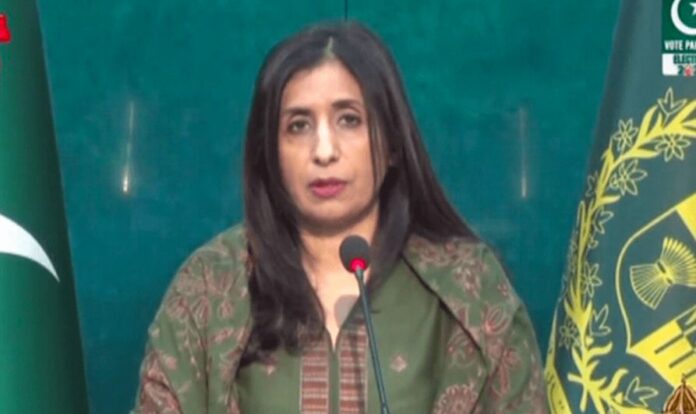ISLAMABAD, JAN 17: The Foreign Office (FO) on Wednesday said Pakistan has decided to recall its ambassador from Iran and suspend all high-level visits ongoing or planned between the two countries following the “unprovoked violation of its airspace” by Tehran.
Iran, on the other hand, claimed that it targeted an “Iranian terrorist group” and “none of the nationals of the friendly and brotherly country of Pakistan were targeted by Iranian missiles and drones”.
The development came after the FO, in a statement released late on Tuesday night, denounced the strikes in Pakistani territory that resulted in “deaths of two innocent children while injuring of three girls”. It termed the incident a “violation of Pakistan’s sovereignty”.
While the FO did not mention the location of the incident, Iranian state media said the attack took place in the border town of Panjgur in Balochistan.
Iran’s state-run Nour News agency said the attack destroyed the Pakistan headquarters of the Jaish al-Adl.
Iran’s semi-official Tasnim news agency said the “focal point of this operation was the region known as Kouh-Sabz (green mountain)” in Balochistan.
“Two key strongholds of the Jaysh al-Dhulm (Jaish al-Adl) terrorist group in Pakistan” were “specifically targeted and successfully demolished by a combination of missile and drone attacks”, the Tasnim news agency said.
Local authorities said they had also received information about such an attack but had no further details. Reports from the area suggested that a missile hit a mosque, partially damaging it and injuring some people.
According to AFP, hours before the attack, caretaker Prime Minister Anwaarul Haq Kakar had met Iranian Foreign Minister Hossein Amir-Abdollahian on the sidelines of the World Economic Forum in Davos, Switzerland.
In a press briefing in Islamabad today, FO spokesperson Mumtaz Zahra Baloch said last night’s “unprovoked and blatant breach of Pakistan’s sovereignty by Iran” was a violation of international law and the purposes and principles of the Charter of the United Nations.
“This illegal act is completely unacceptable and has no justification whatsoever,” she asserted.
“Pakistan reserves the right to respond to this illegal act and the responsibility for the consequences will lie squarely with Iran,” Baloch said, adding that Islamabad had conveyed the message to the Iranian government.
“We have also informed them that Pakistan has decided to recall its ambassador from Iran and that the Iranian ambassador to Pakistan, who is currently visiting Iran, may not return for the time being,” she said.
Baloch added that Islamabad had decided to suspend all high-level visits which were ongoing or were planned between Pakistan and Iran in the coming days.
Iran claims targeted ‘terrorist group in Pakistan’
Meanwhile, Tehran’s top diplomat has alleged that his country’s armed forces targeted an “Iranian terrorist group” in Pakistan later Tuesday night.
“On Pakistan, none of the nationals of the friendly and brotherly country of Pakistan were targeted by Iranian missiles and drones,” Foreign Minister Hossein Amir-Abdollahian said on the sidelines of the World Economic Forum in Davos, Switzerland.
“The so-called Jaish Al Adl group, which is an Iranian terrorist group, was targeted,” he added.
Amir-Abdollahian said Iran’s attack on “Pakistan’s soil” was a response to the Jaish Al Adl group’s recent deadly attacks, particularly on the city of Rask in the southeastern province of Sistan-Baluchistan.
“The group has taken shelter in some parts of Pakistan’s Balochistan province,” he claimed, adding that “we’ve talked with Pakistani officials several times on this matter”.
The foreign minister said Iran respected the sovereignty and territorial integrity of Pakistan but would not “allow the country’s national security to be compromised or played with”.
Earlier, Iran’s Deputy President for Parliamentary Affairs Mohammad Hosseini claimed Pakistan had been warned “that they must prevent the entry into Iran of people who kill large numbers of people, it was natural to have the reaction of the Islamic republic”.
China urges Pakistan, Iran to ‘exercise restraint’
Separately, China has urged Pakistan and Iran to show “restraint” following the incident.
Speaking at a regular briefing today, China Foreign Ministry Spokesperson Mao Ning said: “We call on both sides to exercise restraint, avoid actions that would lead to an escalation of tension and work together to maintain peace and stability.”
“We consider both Iran and Pakistan as close neighbours and major Islamic countries,” she added.
It must be noted that both Iran and Pakistan are close partners of Beijing and members of the Shanghai Cooperation Organisation — a political and security union of countries spanning much of Eurasia, including China, India and Russia.
‘Unacceptable and condemnable’
The incident also triggered condemnations from across Pakistan.
In a post on social media platform X, caretaker Balochistan Information Minister Jan Achakzai expressed disappointment and said terrorism was a common threat to all countries in the region that required coordinated action.
“Such acts of air space violations by Iran undermine neighbourly relation, trust and renewed trade linkages established with Balochistan,” he added.
Former prime minister Shehbaz Sharif said he was “shocked at the Iranian breach of Pakistani sovereignty”. He also extended condolences to the grieving families.
“This missile attack is against the spirit of our friendship and principles of good neighbourliness, especially as it undermines the historic relationship between our two countries,” Shehbaz said, stressing that sincere dialogue and meaningful cooperation between the two countries was the need of the hour.
Ex-federal minister and PPP leader Sherry Rehman termed the incident “unacceptable and condemnable”.
“Pakistan has acted with restraint whenever there’s been turbulence on the Pak-Iran border by terrorist groups, and always sought collective responses to the transnational challenge of terrorism,” she wrote on X.
Sherry further stated that such strikes eroded Muslim unity at an “existential moment of great need for jointly navigating forums for cooperation while the traffic and painful genocide in Gaza at the hand of Israel”.
“Thirdly, de-escalation will need Tehran to understand that violence and conflict are exactly what non-state actors and terrorists are seeking. That gives them fertile ground for metastasising,” she said.
Sherry added that Pakistan had no stakes in “fanning the flames of such conflict but will obviously have to respond if better sense does not prevail”.
Activist and lawyer Jibran Nasir also strongly condemned the airstrike, saying that there was no justification for the attack and violation by Iran given the “cordial relations” shared by the two countries.
He appreciated the government’s “measured” response to the incident. “Terrorism is indeed a common threat as reiterated by the Pak Govt & only longstanding solution is sincere and joint efforts between the two countries. Our sovereignty must be paramount,” Nasir added.
‘Violation of Pakistan’s sovereignty’
In the statement released late on Tuesday night, the FO vehemently protested the “violation of Pakistan’s sovereignty”, calling it “completely unacceptable” and warning it “can have serious consequences”.
It expressed concern that the “illegal act” took place despite the existence of several established channels of communication between Pakistan and Iran, adding that a “strong protest has already been lodged with the concerned senior official in the Iranian Ministry of Foreign Affairs in Tehran”.
It said: “Additionally, the Iranian Charge d’affaires has been called to the Ministry of Foreign Affairs to convey our strongest condemnation of this blatant violation of Pakistan’s sovereignty and that the responsibility for the consequences will lie squarely with Iran.”
“Pakistan has always said terrorism is a common threat to all countries in the region that requires coordinated action. Such unilateral acts are not in conformity with good neighbourly relations and can seriously undermine bilateral trust and confidence,” the statement concluded.
Last month, at least 11 Iranian police officers were killed in an attack overnight on a police station in the southeastern province of Sistan-Baluchestan. Iranian Interior Minister Ahmad Vahidi, while visiting the site, had urged Pakistan to prevent terrorist groups from establishing bases within its borders, the official news agency of Iran reported at the time. He had also noted that initial investigations suggested the assailants had entered Iran from Pakistan.
Caretaker Foreign Minister Jalil Abbas Jilani in a phone call with his Iranian counterpart Hossein Amir Abdollahian had strongly condemned the terrorist attack and reaffirmed Pakistan’s commitment to Iran in combating terrorism.
Similar attacks have occurred previously, including on July 23 last year when four policemen were killed while on patrol. That came two weeks after two policemen and four assailants were killed in a shootout in the province, claimed by Jaish Al Adl.
In May, five Iranian border guards died in clashes with an armed group in Saravan, southeast of Zahedan, the provincial capital of Sistan-Baluchestan.
State media reported at the time that the attack was carried out by “a terrorist group that was seeking to infiltrate the country”, but its members “fled the scene after suffering injuries”.

















